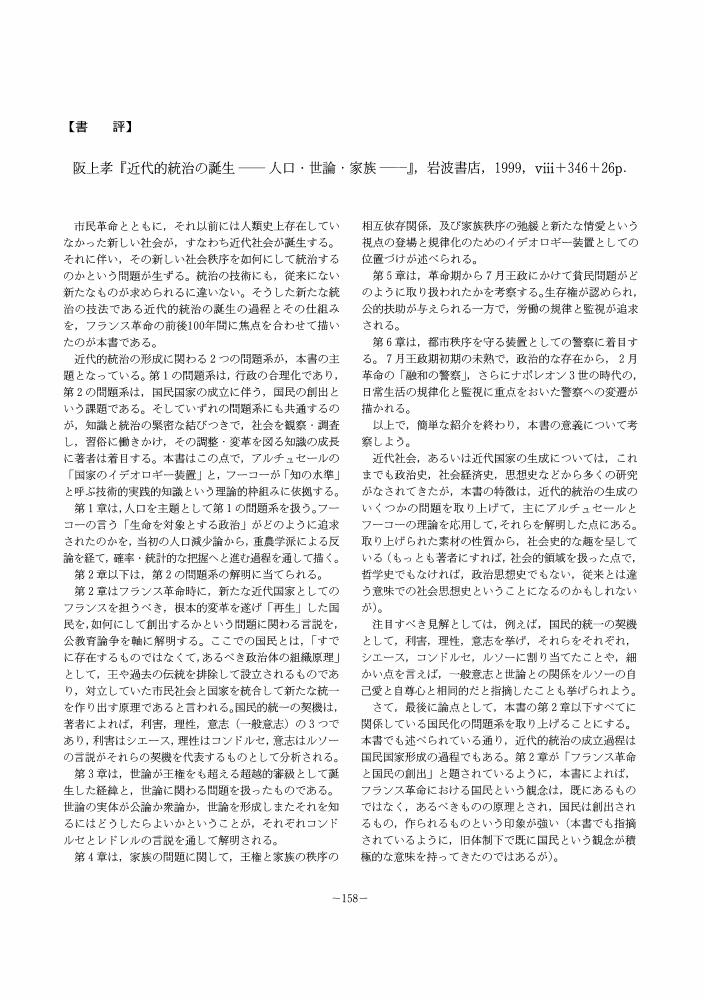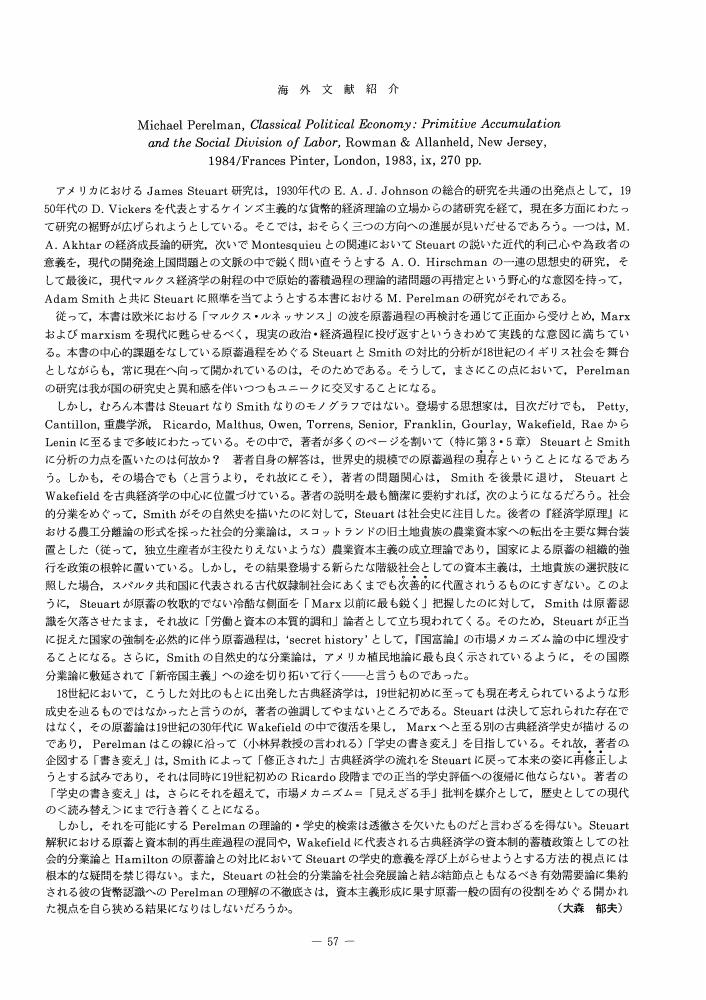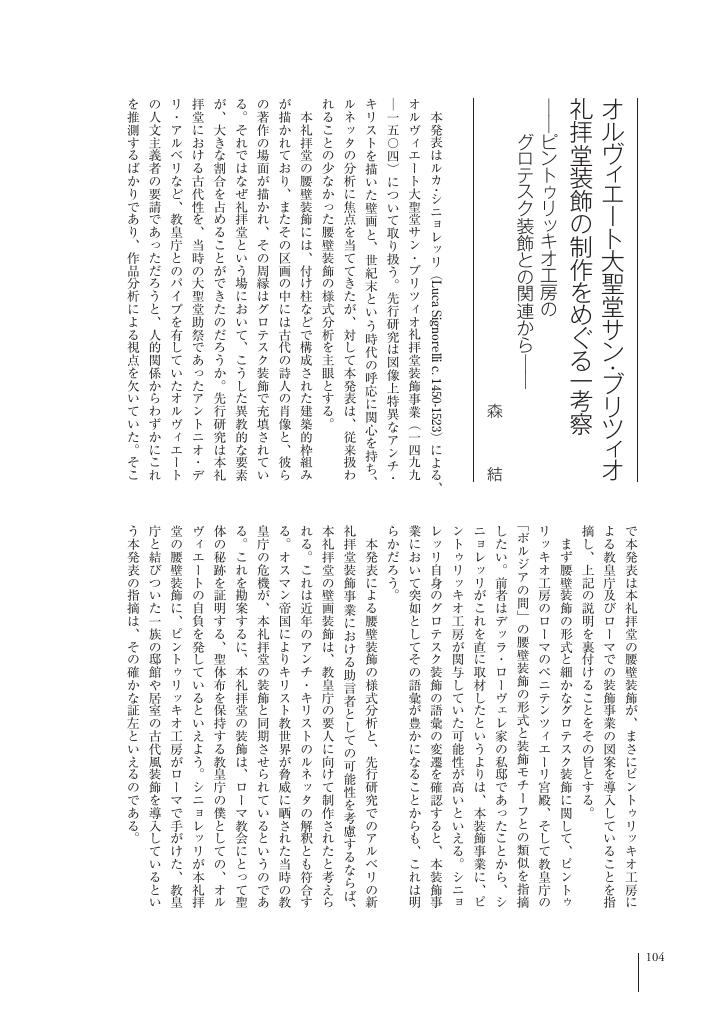- 著者
- 森村 敏己
- 出版者
- 経済学史学会
- 雑誌
- 経済学史研究 (ISSN:18803164)
- 巻号頁・発行日
- vol.48, no.2, pp.114-115, 2006-12-20 (Released:2010-08-05)
1 0 0 0 OA ヘンリー・クレイにおける産業, 組織, 協業
- 著者
- 若森 みどり
- 出版者
- The Japanese Society for the History of Economic Thought
- 雑誌
- 経済学史学会年報 (ISSN:04534786)
- 巻号頁・発行日
- vol.44, no.44, pp.45-58, 2003 (Released:2010-08-05)
- 参考文献数
- 18
Henry Clay [1883-1954] was known as a strong advocate of “rationalisation” in the decade of the 1920s. In 1933 he was appointed to an economic adviser of Montague Norman who was the governor of the Bank of England. The purpose of this paper is to examine Clay's ideas regarding the industry, economic organisation, and co-operation that evolved in the period from 1916 to 1929.Clay lectured on economics for the Worker's Educational Association between 1909 and 1917, and published a book entitled Economics: an Introduction for the General Reader [1916]. Clay's intention was to explain the social arrangements which make the business transaction “possible.” For Clay, economics should be the study of business in its social aspect; it is the object of economics to explain such arrangements in detail and to show how the system works, and economists should study what points of contact the economic order has with the political order, and how far the economic order harmonies with the moral order. Criticizing “a survival from the period of orthodox laissez faire, ” Clay suggested that the object of economics was not the advocacy of the present economic system. Focusing on specialisation and the production system's dependence on anticipated demand, Clay treated difficulties such as severe fluctuations, over-production, and the unemployment that accompanied them as “imperfections of co-operation.” Clay closely evaluated the social role of businessmen in organizing and co-ordinating industry both efficiently and morally, because they prevented those difficulties. In addition, Clay insisted that the economic organisation in the past had been moralized by the action of the State quite as much as through the economic actions of individuals; a few examples would be the reform of the early factories, the abolition of infant labour in mines, the regulation of dangerous trades, and the prevention of deleterious adulteration, all of which had needed the intervention of the State.After the First World War, the economic conditions and circumstances dramatically changed. Clay came to consider that the most urgent problem was how to reconstruct the British industry. Immediately following the war, Clay insisted on the need for the imperative leadership of government to reset an industrial order for peace (Clay 1918). However, the government did not take such measures. So Clay blamed the difficulties of the post-war unemployment problem and those of depressed industries on the mismanagement of the government including the return to the gold standard (Clay 1929a, 1929b). The greater comparative depression of the export industries was one of the most striking features of the post-war period. In late 1920s, Clay suggested “rationalisation”: the regeneration of private enterprise or the amalgamation of small businesses by banks. Clay regarded the banks to have the ability to reorganize finance and give strategic knowledge to firms, both of which were necessary for efficient management.
1 0 0 0 OA 「『重商主義再考』に対する3つのコメント」へのリジョインダー
- 著者
- 大森 郁夫
- 出版者
- 経済学史学会
- 雑誌
- 経済学史学会年報 (ISSN:04534786)
- 巻号頁・発行日
- vol.44, no.44, pp.118-120, 2003 (Released:2010-08-05)
- 著者
- 森岡 邦泰
- 出版者
- 経済学史学会
- 雑誌
- 経済学史学会年報 (ISSN:04534786)
- 巻号頁・発行日
- vol.41, no.41, pp.96-97, 2002 (Released:2010-08-05)
1 0 0 0 OA カール・ポランニーの「二重運動」と自由
- 著者
- 若森 みどり
- 出版者
- The Japanese Society for the History of Economic Thought
- 雑誌
- 経済学史学会年報 (ISSN:04534786)
- 巻号頁・発行日
- vol.39, no.39, pp.146-158, 2001 (Released:2010-08-05)
- 参考文献数
- 26
As did his many contemporary thinkers Karl Polanyi (1886-1964), in the last chapter of his The Great Transformation under the title of “Freedom in a Complex Society, ” dealt with the problem of freedom. In the keen distinction from the ordinal interpretation that the tendency “from laissez-faire to state intervention” or “from individualism to collectivism” directly led to Fascism, Polanyi described the institutional or historical origins of that crisis in the light of his “double movement” interpretation of the nineteenth century industrial society.According to him, the problem of freedom in his time arose on two levels: the institutional and the moral or religious. How is the “free society” reorganized? On the institutional level, Polanyi suggested that the improvement of industrial conditions and employment through the support of planning and control were important. On the moral and religious level, a new view of freedom was needed. It was in this regard that Polanyi respected Robert Owen, because Owen not only rejected the identification of freedom with the mere liberation of profit motives or with “individualization”, but favored the reconstruction of humanity and freedom in the form of “society as a whole”.
- 著者
- 若森 章孝
- 出版者
- The Japanese Society for the History of Economic Thought
- 雑誌
- 経済学史学会年報 (ISSN:04534786)
- 巻号頁・発行日
- vol.38, no.38, pp.200-201, 2000 (Released:2010-08-05)
- 著者
- 森岡 邦泰
- 出版者
- 経済学史学会
- 雑誌
- 経済学史学会年報 (ISSN:04534786)
- 巻号頁・発行日
- vol.38, no.38, pp.158-159, 2000 (Released:2010-08-05)
- 著者
- 森本 孝
- 出版者
- 経済学史学会
- 雑誌
- 経済学史学会年報 (ISSN:04534786)
- 巻号頁・発行日
- vol.35, no.35, pp.157-158, 1997 (Released:2010-08-05)
1 0 0 0 OA 保住敏彦『ドイツ社会主義の政治経済思想』, 法律文化社, 1993, 8+7+272p.
- 著者
- 森岡 孝二 保住 敏彦
- 出版者
- 経済学史学会
- 雑誌
- 経済学史学会年報 (ISSN:04534786)
- 巻号頁・発行日
- vol.32, no.32, pp.162-163, 1994 (Released:2010-08-05)
1 0 0 0 OA トマス・アクィナスの経済論
- 著者
- 森岡 邦泰
- 出版者
- The Japanese Society for the History of Economic Thought
- 雑誌
- 経済学史学会年報 (ISSN:04534786)
- 巻号頁・発行日
- vol.31, no.31, pp.47-57, 1993 (Released:2010-08-05)
We have two interpretations about the concept of the just price of St. Thomas Aquinas: the one is a cost of production theory (objective value), in which production costs represented mainly or only wages just sufficient to allow producers or traders to live in a manner befitting their status in society, the other, utlity theory (subjective value) or a subjective nature of value determined by “usefulness”, in fact a market price.We adopt an anthropological aproach to the matters of medieval age and anlayse attentively the differences of Thomas' texts and Aristotle's original ones. As a result we have Thomas' model of society.According to his model, the cost of production theory is more sustainable in terms of products made by man, on the other hand we recognise a moment of subjective nature of value in terms of non-products, which however pertain to only his ontological hierarchy. In addition the nature of subjectivity is not that of utility in the modern sense, but necessity of community, which is typical of a traditional society. We conclude that the just price of Thomas is mainly founded on labour and costs and in the same time can be a market price in his model of society.
1 0 0 0 OA エルヴェシウス; 功利主義における名誉心
- 著者
- 森村 敏己
- 出版者
- The Japanese Society for the History of Economic Thought
- 雑誌
- 経済学史学会年報 (ISSN:04534786)
- 巻号頁・発行日
- vol.30, no.30, pp.37-45, 1992 (Released:2010-08-05)
This essay discusses the thoughts of Helvétius, by focusing on the reaction to his first book De l'esprit, which evoked an furious outcry, not only from the religious authorities but from the philosophes.It is his egoistic hedonism that has become the target of criticism. Helvétius asserted that the man is necessarily governed by the pleasure and pain derived from the senses. The Church attacked this theory as destructive to the Christianity and the philosophes opposed the sympathy or the natural goodness in human nature to Helvétius's selfish principles. These critics, however, underestimated the role of “Honour” in his moral philosophy. Helvétius argued that the man, selfish as he is, should contribute to the public interest, provided that his virtuous action would be dully rewarded with the esteem of the public. Thus Honour comes to be the key to his moral science. But in France under the Ancien Régime, this moral sanction did not work efficiently, because the political power was exclusively occupied by the aristocracy whose interest was opposed against the public interest. Helvétius, therefore, demands a radical reform that will make it possible to controll the government by the public interest.
1 0 0 0 OA ローダーデール蔵書について
- 著者
- 服部 正治 大森 郁夫
- 出版者
- The Japanese Society for the History of Economic Thought
- 雑誌
- 経済学史学会年報 (ISSN:04534786)
- 巻号頁・発行日
- vol.27, no.27, pp.44-47, 1989 (Released:2010-08-05)
- 著者
- 大森 郁夫
- 出版者
- The Japanese Society for the History of Economic Thought
- 雑誌
- 経済学史学会年報 (ISSN:04534786)
- 巻号頁・発行日
- vol.23, no.23, pp.57, 1985 (Released:2010-08-05)
1 0 0 0 OA 森茂也『イギリス古典学派における需給論』-スミスからケアンズまで-1961年
- 著者
- 森 茂也
- 出版者
- The Japanese Society for the History of Economic Thought
- 雑誌
- 経済学史学会年報 (ISSN:04534786)
- 巻号頁・発行日
- vol.1, no.1, pp.49-51, 1963 (Released:2010-08-05)
1 0 0 0 OA 幻視と貝殻 カルパッチョ作 《聖アウグスティヌスの幻視》の再検討
- 著者
- 森田 優子
- 出版者
- 美学会
- 雑誌
- 美学 (ISSN:05200962)
- 巻号頁・発行日
- vol.69, no.2, pp.93, 2018 (Released:2020-03-23)
1 0 0 0 OA ティツィアーノ作《マリアの神殿奉献》に関する一考察 ヴェネツィア、マリア、カリタ(慈愛)
- 著者
- 森本 奈緒美
- 出版者
- 美学会
- 雑誌
- 美学 (ISSN:05200962)
- 巻号頁・発行日
- vol.67, no.2, pp.105, 2016 (Released:2018-01-01)
- 著者
- 森 結
- 出版者
- 美学会
- 雑誌
- 美学 (ISSN:05200962)
- 巻号頁・発行日
- vol.67, no.2, pp.104, 2016 (Released:2018-01-01)
- 著者
- 森 功次
- 出版者
- 美学会
- 雑誌
- 美学 (ISSN:05200962)
- 巻号頁・発行日
- vol.66, no.2, pp.136, 2015-12-31 (Released:2017-05-22)
1 0 0 0 OA サルトル『聖ジュネ』における不道徳作品の「善用」
- 著者
- 森 功次
- 出版者
- 美学会
- 雑誌
- 美学 (ISSN:05200962)
- 巻号頁・発行日
- vol.63, no.1, pp.37-48, 2012-06-30 (Released:2017-05-22)
In the last section of Saint Genet (1952), Jean-Paul Sartre attempts to vindicate Jean Genet's immoral works. Sartre tries to save Genet from severe moral criticism in French literary world at the time. In this paper, I will organize Sartre's argument and examine his complex defense. According to Sartre, the immorality of Genet's works consists in the veriter's devious intention to invert our values and the bad influence he has on his readers. On the other hand, Sartre claims that Genet's works have some moral merits: to give readers some understanding of what Sartre calls 'solitary' positions such as Genet's, and to impress upon readers an identical possibility for themselves. Moreover, these moral merits are supported by the aesthetic appreciation of his works. The fact that readers could fully appreciate Genet's immoral works irresistibly points out to the readers the relation between themselves and the immorality of the works. It is not, however, clear how these moral merits are able to overcome the criticism against Genet. Moreover, because Sartre's argument presupposes an appreciation that deviates from Genet's own intention, which Sartre himself recognizes, it is not clear whether or not Sartre's attempted vindication can be viewed as a legitimate evaluation of Genet's works.
1 0 0 0 ミャンマーの3つの鉱区におけるルビーの特徴について
- 著者
- 森 孝仁 奥田 薫
- 出版者
- 宝石学会(日本)
- 雑誌
- 宝石学会(日本)講演会要旨
- 巻号頁・発行日
- vol.27, pp.12, 2005
<br> 日本市場でも大変人気のあるルビーであるが、中でもミャンマー産は高く評価されている。<br> ミャンマーのルビーは、mong-hsu(シャン州)、mogok(マンダレー区)、nam-ya(カチン州)の3つの鉱区から産出する。日本の市場では、鉱区まで明記して販売することは稀であるが、最近では、鑑別書に表記改定に伴い、加熱処理の有無を明確にさせることからも、しばしば鉱区を特定する必要性が生じるようになってきた。一般にmogokとnam-yaのルビーは良質で、加熱処理の必要のないものがあり、mong-hsuのルビーは加熱することにより、鮮やかな赤色に変化するといわれている。<br> 今回、株式会社モリスはミャンマーの協力を得て、3つの鉱区からの未処理のルビー原石および母岩を入手することができた。それぞれの母岩をもとに、鉱区の成り立ちを検証するとともに、未処理のルビー原石について、内包物の拡大検査、可視分光吸収特性および含有微量元素について調査を行なった。<br> ミャンマーの3つの鉱区におけるルビーの特徴について、今回得られた結果を報告する。













